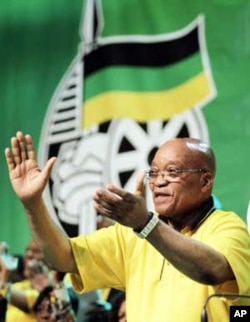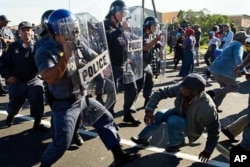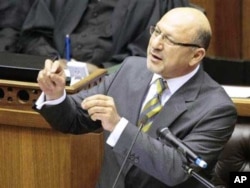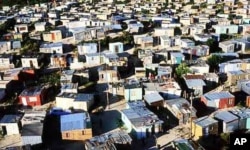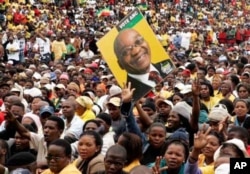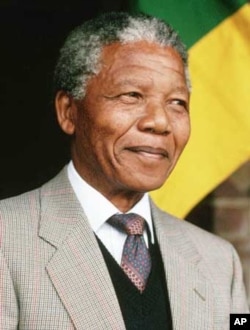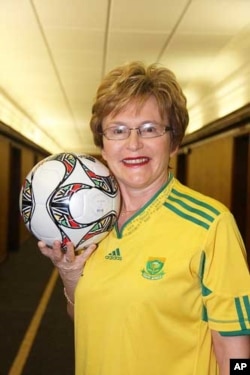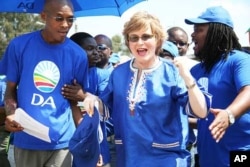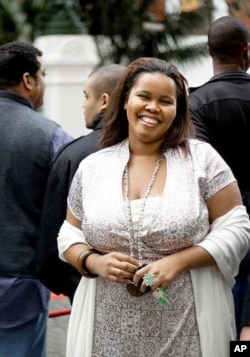This is Part 1 of a 5-part series: Municipal Elections in South Africa-
Parts 1 / 2 / 3 / 4 / 5
One of South Africa’s leading analysts on local government issues described the forthcoming polls as “very significant,” calling them the “first real political test” of President Jacob Zuma’s government since the African National Congress [ANC] leader came to power in 2009.
“I think from that perspective it is quite important for the ANC, and especially for President Zuma, that the ANC delivers very good results in this election,” said Dirk Kotze, a professor of politics at the University of South Africa in Pretoria.
South Africa’s previous municipal vote, in 2006, saw the ANC win control of five of the country’s six metropolitan councils. But some political commentators feel the party, which has dominated national and local government since it won the nation’s first democratic elections in 1994, is in danger of losing several cities to main opposition party, the Democratic Alliance [DA], in elections scheduled for May 18.
The DA has managed the Cape Town council since 2006 and boasts a largely impressive record of delivering services to the city’s inhabitants, while surveys show that dissatisfaction with the ANC’s provision of basic services is at an all-time high.
In the run-up to the municipal elections, there have been unprecedented and violent protests against city and town councils led by the ANC across South Africa. Residents, demonstrating against non-delivery of essential services such as housing, water and electricity, have rampaged through the streets, destroying government property. The police have sometimes opened fire on protestors, and there’ve been many injuries and some fatalities.
Even top ANC members, such as Minister in the Presidency Trevor Manuel, have vehemently criticized the party for its poor service delivery record.
The leader of the ANC-aligned Congress of South African Trade Unions, Zwelinzima Vavi, said the party is riddled with “rot and malaise” and corruption.
He warned that the upcoming polls could see the ruling party usurped by the DA in what were previously ANC strongholds. “If we allow people to take our movement in the direction they are taking it, very soon we will have to call someone ‘President Zille,’” Vavi has said, in reference to DA leader Helen Zille.
ANC achievements
Yet the ANC insists it has “significantly” improved the lives of the vast majority of South Africans through “successful, democratic local government.” In a statement sent to VOA, the party listed some of its “major achievements” in providing municipal services, especially to the country’s millions of poor people in recent years.
In 1994, it maintained, only 62 percent of South African households had access to “adequate” water supplies. In 2010, said the ANC, “93 percent of the population had access to an improved drinking water supply.”
Opposition parties dispute the ANC’s statistics, saying the figure is far lower.
In 1994, said the ANC, about 610,000 South African households did not have toilets, using buckets to dispose of human waste. In 2009, it said, just over 9,000 households were using the “bucket system” and it expects this figure to have fallen “much further” last year.
As a result of improvements such as this, said the ANC, 73 percent of South Africans now have access to basic sanitation services and it expects to deliver “proper” toilets to all South Africans by 2014.
In 1996, said the ANC, just over 30 percent of South African households had electricity. Now, it maintains, thanks to its efforts, more than 80 percent have power. Again, opposition parties say this figure is inflated.
History on ANC’s side
Despite apparent successes, protests against certain municipalities managed by the ANC are continuing in South Africa. And social movements, unhappy with what they say is the government’s failure to provide most poor citizens with land and houses, as the ANC promised to do in 1994, are springing up all over the country.
Kotze said while these organizations are “very successful in mobilizing people” against certain state policies, they are “not yet a direct challenge” to the ANC government.
“For them the DA is just as much unacceptable as the ANC. So it is more of an anti-politics sentiment that’s developing, instead of anti-ANC sentiment specifically,” Kotze said.
He pointed out that despite the many demonstrations against the ANC, and the obvious lack of service delivery in many impoverished parts of South Africa, citizens have largely voted for ANC candidates ever since the first municipal polls in 1995.
With a few possible exceptions, said Kotze, this trend is set to continue on May 18. “Voters in South Africa are not ‘rational choice’ type of voters; (they don’t give) allegiance to political parties based on, for example, very attractive election manifestos or based on poor service delivery by the incumbent government.”
He explained that South Africans often vote for ANC candidates – “no matter how good or bad their service delivery records” – simply because the candidates represent the party that liberated their country from apartheid, and they associate the candidates with iconic former president Nelson Mandela.
“We are still stuck in that framework when making political choices. That is why it is so very difficult for any of the opposition parties to exploit a shifting vote – because this really doesn’t exist, to a large extent,” said Kotze.
Culture of not paying rates and taxes
Like other analysts, the politics professor is convinced that only “very low voter participation” could hurt the ANC. He said such a “stay-away” by people who traditionally vote for ruling party candidates could happen because of the poor performance of some municipalities led by the ANC.
“There’s a feeling of arrogance on the side of councilors and the feeling that they are untouchable because they basically represent the ANC. And that (allows) them to work with impunity and not be responsive and accountable to the communities where they come from,” Kotze explained.
A “good example” of this, he continued, is the case of Nkosinathi Shabalala, who has been nominated by the ANC to stand in the election as a councilor in Katlehong, east of Johannesburg. In a recent report in The Times newspaper, Shabalala acknowledged that he himself owed the local municipality 27,000 rands [almost US$ 4,000] for water and electricity. He added that he would refuse to pay because “nobody is paying their bills.” Shabalala asked, “So why should I pay?”
Kotze said a “culture of non-delivery and non-payment” represented by the prospective city councilor’s attitude is “one of the key problems” with local government in South Africa.
He added that the country has “sophisticated legislation” that should ensure good municipal services, but “doesn’t have the local officials who are skilled enough to implement it.”
Many councilors, Kotze said, are simply poor managers. “In many cases there are local authorities that don’t spend their budgets (for) the year because they don’t have the capacity to do it.… So ratepayers end up paying for services they do not receive” and so eventually stop paying their bills.
Race politics
But Kotze said he expects a “stay away” from the polls by people upset at the ANC’s alleged lack of delivery to benefit the DA only in “limited” regions of South Africa, because the main opposition party doesn’t yet have “national presence.”
One of the main problems facing the DA, he said, “is that it is concentrated only in two of the nine provinces. That means they are not able to really challenge the ANC at a national level. ”
Sixty-five percent of the DA’s votes in the 2009 general elections came from the Gauteng and Western Cape provinces. “One of the opposition’s key challenges is to develop a national presence. If they can’t do this, they won’t be a true alternative to the ANC,” Kotze said.
Another factor counting against the DA, he said, is the perception that it represents the interests of South Africa’s privileged whites – personified by its leader, Helen Zille.
Kotze agrees that while the ANC benefits from its history as the party that successfully battled white supremacy, the DA is to a degree hamstrung by its past – even though many DA leaders, including Zille, have impressive records of opposing apartheid.
“The DA’s history is one that comes from the more liberal, white tradition, and it’s quite difficult for them to change their identity or their public profile,” he said.
The problem for the DA, said Kotze, is that almost two decades after apartheid ended most South Africans still vote along racial lines. So while the DA has a good record of service delivery in areas where it’s in power, it’s still seen as a “white party,” so most black South Africans consistently vote against it.
But he does see this scenario changing in the future as a result of the DA’s “aggressive” attempts to transform itself into a political movement representing all races in South Africa. With the ANC leaders being almost exclusively black, the DA has in recent years become the country’s most racially diverse political party.
“So the whole identity of the DA in terms of its positioning in politics is changing, and I think that has some (positive) impact already on their results,” Kotze explained.
Analysts are united in their belief that dire implications will follow for South Africa if delivery of services to most people continues to be poor after the May local government elections. Some have described the country’s legions of poor people as “a powder keg.”




